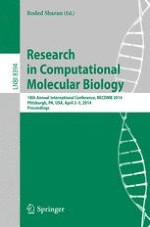2014 | OriginalPaper | Buchkapitel
Simultaneous Inference of Cancer Pathways and Tumor Progression from Cross-Sectional Mutation Data
verfasst von : Benjamin J. Raphael, Fabio Vandin
Erschienen in: Research in Computational Molecular Biology
Verlag: Springer International Publishing
Aktivieren Sie unsere intelligente Suche, um passende Fachinhalte oder Patente zu finden.
Wählen Sie Textabschnitte aus um mit Künstlicher Intelligenz passenden Patente zu finden. powered by
Markieren Sie Textabschnitte, um KI-gestützt weitere passende Inhalte zu finden. powered by
Recent cancer sequencing studies provide a wealth of somatic mutation data from a large number of patients. One of the most intriguing and challenging questions arising from this data is to determine whether the temporal order of somatic mutations in a cancer follows any common progression. Since we usually obtain only one sample from a patient, such inferences are commonly made from cross-sectional data from different patients. This analysis is complicated by the extensive variation in the somatic mutations across different patients, variation that is reduced by examining combinations of mutations in various pathways. Thus far, methods to reconstruction tumor progression at the pathway level have restricted attention to known,
a priori
defined pathways.
In this work we show how to
simultaneously
infer pathways and the temporal order of their mutations from cross-sectional data, leveraging on the exclusivity property of driver mutations within a pathway. We define the Pathway Linear Progression Model, and derive a combinatorial formulation for the problem of finding the optimal model from mutation data. We show that while this problem is NP-hard, with enough samples its optimal solution uniquely identifies the correct model with high probability even when errors are present in the mutation data. We then formulate the problem as an integer linear program (ILP), which allows the analysis of datasets from recent studies with large number of samples. We use our algorithm to analyze somatic mutation data from three cancer studies, including two studies from The Cancer Genome Atlas (TCGA) on large number of samples on colorectal cancer and glioblastoma. The models reconstructed with our method capture most of the current knowledge of the progression of somatic mutations in these cancer types, while also providing new insights on the tumor progression at the pathway level.
